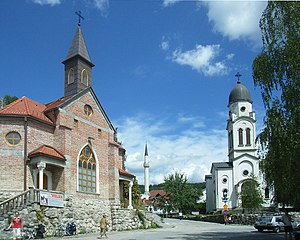Our website is made possible by displaying online advertisements to our visitors.
Please consider supporting us by disabling your ad blocker.
European Islam
This article possibly contains original research. (November 2009) |

European Islam, or Euro-Islam, is a hypothesized new branch of Islam[1] that historically originated and developed among the European peoples of the Balkans[2] (Albania, Bosnia and Herzegovina, Kosovo,[3] and Turkey)[4] and parts of countries in Eastern Europe with sizable Muslim minorities (Bulgaria, Montenegro, North Macedonia,[5] and some republics of Russia)[5][6][7][8] which constitute of large populations of European Muslims.[5][6][7][8] Historically significant Muslim populations in Europe include the Ashkali and Balkan Egyptians,[3] Gorani, Torbeshi, Pomaks, Bosniaks, Chechens, Muslim Albanians, Ingushs, Greek Muslims, Vallahades, Muslim Romani people, Balkan Turks, Turkish Cypriots, Cretan Turks, Yörüks, Volga Tatars, Crimean Tatars, Lipka Tatars, Kazakhs, Gajals,[2] and Megleno-Romanians from Notia today living in Turkey,[9] although the majority are secular.[3][6][7]
The terms "European Islam" and "Euro-Islam" were originally introduced at a conference presided by Carl E. Olivestam, senior lecturer at Umeå University, in Birmingham in 1988, and subsequently published in the Swedish handbook: Kyrkor och alternativa rörelser ("Churches and Alternative Movements"). "European Islam" defines the ongoing debate on the social integration of Muslim populations in Western European countries such as France, Germany, the United Kingdom, and the Netherlands.[8][10][11] There are three Islamic scholars who participate in the debate on "Euro-Islam": Enes Karić,[12] Bassam Tibi,[13][14] and Tariq Ramadan,[8][14] who adopted the term in the second half of the 1990s but use it with different meanings.[14] The foremost Western, Non-Muslim scholars of political science and/or Islamic studies involved in the debate on "Euro-Islam" are Jocelyne Cesari, Jørgen S. Nielsen, and Olivier Roy.[8][10]
- ^ AlSayyad, Nezar (2002). "Islam, Europe, and the Identity of the Changing Nation-State". In AlSayyad, Nezar; Castells, Manuel (eds.). Muslim Europe Or Euro-Islam: Politics, Culture, and Citizenship in the Age of Globalization. Lanham, Maryland: Rowman & Littlefield, co-published with the Center for Middle Eastern Studies (University of California, Berkeley). pp. 18–21. ISBN 978-0-7391-0338-8. LCCN 2001050240.
- ^ a b Popović, Alexandre; Rashid, Asma (Summer–Autumn 1997). "The Muslim Culture In The Balkans (16th–18th Centuries)". Islamic Studies. 36 (2/3, Special Issue: Islam In The Balkans). Islamic Research Institute (International Islamic University, Islamabad): 177–190. eISSN 2710-5326. ISSN 0578-8072. JSTOR 23076193.
- ^ a b c Ismaili, Besa (2013). "Kosovo". In Nielsen, Jørgen S.; Akgönül, Samim; Alibašić, Ahmet; Racius, Egdunas (eds.). Yearbook of Muslims in Europe. Vol. 5. Leiden and Boston: Brill Publishers. pp. 369–381. doi:10.1163/9789004255869_025. ISBN 978-90-04-25586-9. ISSN 1877-1432.
- ^ Raudvere, Catharina (2019). "Between Religiosity, Cultural Heritage, and Politics: Sufi-Oriented Interests in Contemporary Bosnia and Herzegovina". In Malik, Jamal; Zarrabi-Zadeh, Saeed (eds.). Sufism East and West: Mystical Islam and Cross-Cultural Exchange in the Modern World. Studies on Sufism. Vol. 2. Leiden and Boston: Brill Publishers. pp. 233–258. doi:10.1163/9789004393929_011. ISBN 978-90-04-39392-9. LCCN 2019004608. S2CID 199364516.
- ^ a b c Macnamara, Ronan (January 2013). "Slavic Muslims: The forgotten minority of Macedonia". Security and Human Rights. 23 (4). Leiden: Brill Publishers/Martinus Nijhoff Publishers on behalf of the Netherlands Helsinki Committee: 347–355. doi:10.1163/18750230-99900038. eISSN 1875-0230. ISSN 1874-7337.
- ^ a b c Cesari, Jocelyne, ed. (2014). "Part III: The Old European Land of Islam". The Oxford Handbook of European Islam. Oxford: Oxford University Press. pp. 427–616. doi:10.1093/oxfordhb/9780199607976.001.0001. ISBN 978-0-19-960797-6. LCCN 2014936672. S2CID 153038977.
- ^ a b c Clayer, Nathalie (2004). "Les musulmans des Balkans Ou l'islam de "l'autre Europe"/The Balkans Muslims Or the Islam of the "Other Europe"". Religions, pouvoir et société: Europe centrale, Balkans, CEI. Le Courrier de Pays de l'Est (in French). 5 (1045). Paris: La Documentation française: 16–27. doi:10.3917/cpe.045.0016. ISSN 0590-0239 – via Cairn.info.
- ^ a b c d e Bougarel, Xavier; Clayer, Nathalie (2013). Les musulmans de l'Europe du Sud-Est: Des Empires aux États balkaniques. Terres et gens d'islam (in French). Paris: IISMM – Karthala. pp. 1–20. ISBN 978-2-8111-0905-9 – via Cairn.info.
- ^ Kahl, Thede (2006). Mylonas, Harris (ed.). "The Islamization of the Meglen Vlachs (Megleno-Romanians): The Village of Nânti (Nótia) and the "Nântinets" in Present-Day Turkey". Nationalities Papers. 34 (1). Cambridge University Press: 71–90. doi:10.1080/00905990500504871. ISSN 0090-5992. S2CID 161615853.
- ^ a b Cesari, Jocelyne (2010). "Part 1, Overview: Muslims in Europe and the US – Securitization of Islam in Europe". In Cesari, Jocelyne (ed.). Muslims in the West After 9/11: Religion, Politics, and Law. Routledge Studies in Liberty and Security (1st ed.). London and New York: Routledge. pp. 9–27. ISBN 9780415776547.
- ^ Buturović, Amila (2009) [2006]. "Part V: Islamic Cultural Region – European Islam". In Juergensmeyer, Mark (ed.). The Oxford Handbook of Global Religions. Oxford and New York: Oxford University Press. pp. 437–446. doi:10.1093/oxfordhb/9780195137989.003.0043. ISBN 978-0-19-513798-9. LCCN 2006004402. S2CID 161373775.
- ^ Karić, Enes (2002). "Is 'Euro-Islam' a Myth, Challenge, or a Real Opportunity for Muslims and Europe?". Journal of Muslim Minority Affairs. 22 (2). London: Taylor & Francis: 435–442. doi:10.1080/1360200022000027375. ISSN 1360-2004. S2CID 144393965.
- ^ Tibi, Bassam (1995). "Les conditions d'une "Euro-Islam"". In Bistolfi, Robert; Zabbal, François (eds.). Islams d'Europe: Intégration ou Insertion Communautaire? (in French). Paris: Éditions de l'Aube. pp. 230–234. ISBN 978-2876782013.
- ^ a b c Meer, Nasar (2014). "Euro-Islam". Key Concepts in Race and Ethnicity (3rd ed.). London and Los Angeles: SAGE Publications. pp. 43–46. ISBN 978-0-85702-868-6. LCCN 2013955942.
Previous Page Next Page


